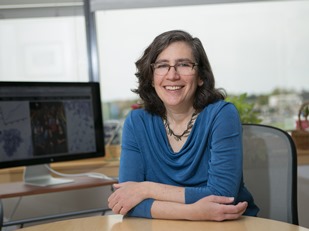Celia Schiffer named chair of Department of Biochemistry & Molecular Biotechnology
New department name reflects role latest technologies bring to problems in biology and medicine
Celia A. Schiffer, PhD, has accepted the position of chair of the newly renamed Department of Biochemistry & Molecular Biotechnology, effective Oct. 1. Formerly the Department of Biochemistry & Molecular Pharmacology, the new name reflects the expanded role of cutting-edge technologies such as cryo-electron microscopy and computational biology, as well as the science of pharmacology in bringing a molecular perspective to problems in biology and medicine.

Dr. Schiffer joined the faculty in 1998, following undergraduate study in physics at the University of Chicago, earning her PhD in biophysics at the University of California San Francisco, and completing postdoctoral fellowships at ETH-Zürich in Switzerland and Genentech, Inc. in South San Francisco.
Since then, she has realized her vision to enable science by realizing, promoting and nurturing the potential of people and scientific inquiries. Her lab primarily studies the molecular basis for drug resistance in viruses. Through this research, she has developed a new paradigm for avoiding drug resistance in structure-based drug design that likely translates to other diseases.
In 2009, she established the Institute for Drug Resistance with academic and industry partners to create a nexus for cross-disciplinary research. It is the only organization in the world with a mission to foster collaborative, cross-disease research for the purpose of accelerating the design, development and delivery of resilient drugs that avoid resistance across multiple diseases and classes of drugs. Her research has resulted in more than 185 publications and $50 million in funding as a principal investigator.
Schiffer’s manifold accomplishments in research and education have been widely honored. She is a fellow of the American Academy of Microbiology and in 2019 was invested as the Gladys Smith Martin Chair in Oncology. In 2020, she was recognized with the William C. Rose Award from the American Society of Biochemistry and Molecular Biology; in 2016 she was named by the Massachusetts Society for Medical Research as educator of the year for excellence in research, mentoring and leadership in bringing women and underrepresented minorities into science; and in 2016 received the inaugural Chancellor’s Award for Excellence in Mentoring from Chancellor Michael F. Collins.
The department Schiffer will lead is large, multi-disciplinary and extremely productive: investigators in the department study mechanisms of protein dynamics, assembly and trafficking; structural biology and molecular biophysics; molecular modeling; mechanisms of epigenetic inheritance; drug discovery; cell and developmental biology; molecular interactions of DNA and RNA; and experimental and computational chemistry.
Schiffer succeeds C. Robert Matthews, PhD, who has retired following 21 years of distinguished leadership of one of the most innovative and scientifically accomplished basic science departments in the country.